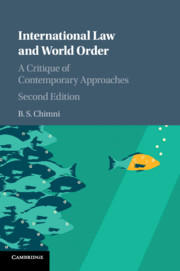Book contents
- International Law and World Order
- International Law and World Order
- Copyright page
- Contents
- Preface to the Second Edition
- Acknowledgements to the First Edition
- Foreword to the First Edition
- 1 Introduction
- 2 The Classical Realist Approach to International Law: The World of Hans Morgenthau
- 3 The Policy-Oriented or New Haven Approach to International Law: The Contributions of Myres McDougal and Harold Lasswell
- 4 Richard Falk and the Grotian Quest: Towards a Transdisciplinary Jurisprudence
- 5 New Approaches to International Law: The Critical Scholarship of David Kennedy and Martti Koskenniemi
- 6 Feminist Approaches to International Law: The Work of Hilary Charlesworth and Christine Chinkin
- 7 Towards an Integrated Marxist Approach to International Law (IMAIL)
- Bibliography
- Index
1 - Introduction
Published online by Cambridge University Press: 28 April 2017
- International Law and World Order
- International Law and World Order
- Copyright page
- Contents
- Preface to the Second Edition
- Acknowledgements to the First Edition
- Foreword to the First Edition
- 1 Introduction
- 2 The Classical Realist Approach to International Law: The World of Hans Morgenthau
- 3 The Policy-Oriented or New Haven Approach to International Law: The Contributions of Myres McDougal and Harold Lasswell
- 4 Richard Falk and the Grotian Quest: Towards a Transdisciplinary Jurisprudence
- 5 New Approaches to International Law: The Critical Scholarship of David Kennedy and Martti Koskenniemi
- 6 Feminist Approaches to International Law: The Work of Hilary Charlesworth and Christine Chinkin
- 7 Towards an Integrated Marxist Approach to International Law (IMAIL)
- Bibliography
- Index
Summary
This book has been written in the belief that much disagreement in international legal discourse is theoretical. As Steven Ratner and Anne-Marie Slaughter observe in their introduction to the volume The Methods of International Law ‘beneath the surface of much scholarship ... are a host of unanswered questions about presuppositions, conceptions, and missions, all of which influence ... analysis of an issue and ... conclusions and recommendations for decision makers’. There are few occasions to clarify the ‘presuppositions, conceptions, and missions’ because explicit theorization is still the exception and unspoken theory tends to occlude arguments pertaining to the underlying epistemological and ontological premises. It is not as if there are not enough theories of, or about, international law. But these are not subjects of sustained debate and reflection. A focus on theory is also necessitated today by the growing ‘specialization and fragmentation’ of the field of international law.
- Type
- Chapter
- Information
- International Law and World OrderA Critique of Contemporary Approaches, pp. 1 - 37Publisher: Cambridge University PressPrint publication year: 2017

